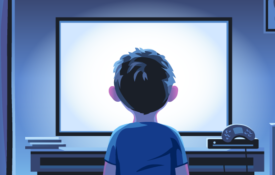
Games Can Be Good – When You Play for the Right Reasons
The effects of playing video games on well-being seem to depend largely on why and how an individual chooses to partake. Visit Page
A meta-analysis finds no clear link between video game violence and aggression in children. Visit Page

The effects of playing video games on well-being seem to depend largely on why and how an individual chooses to partake. Visit Page

Differing conclusions on the link between video games and aggression may come down to how research teams interpret and report their statistical analyses, rather than the underlying data. Visit Page

A large data analysis shows only minimal impact of violent video games on aggressive behavior, but scientists say they need better measures to confirm those findings. Visit Page

Some of the most popular video games feature violence of some kind -- psychological scientists are investigating whether violent in-game behavior actually impacts real-world behavior. Visit Page

Many people speculate that individuals with autism spectrum disorder may be more susceptible to emotionally arousing content found in violent video games, but research suggests the opposite. Visit Page

Research reveals unequivocal evidence that exposure to media violence increases the likelihood of aggressive and violent behavior in both immediate and long-term contexts. Visit Page

Media and video games that portray cooperation and caring have a positive influence on behavior, a cross-cultural study shows. Visit Page

Organizations and associations have issued statements about the effects of media exposure, but many such statements do not accurately reflect the available scientific evidence, researchers find. Visit Page

Denying people the opportunity to engage in stealing, cheating, and other taboo behaviors may lead them to seek out violent video games as a way of managing their frustration. Visit Page

If you’re having trouble getting your kid to the dinner table because they’re playing ‘Fortnite,’ you’re not alone. Over 200 million gamers have registered for the video game worldwide. And it’s not just kids — Visit Page
The New York Times: There may be a new market for video games: octogenarians. Brain scientists have discovered that swerving around cars while simultaneously picking out road signs in a video game can improve the Visit Page
When it comes to kids and screens, it often feels as though parents are wearing headphones with conflicting messages piped into each ear. On one side: a steady drumbeat of increasingly dire warnings about game Visit Page
The New York Times: “You just crashed a little bit,” Adam Gazzaley said. It was true: I’d slammed my rocket-powered surfboard into an icy riverbank. This was at Gazzaley’s San Francisco lab, in a nook Visit Page